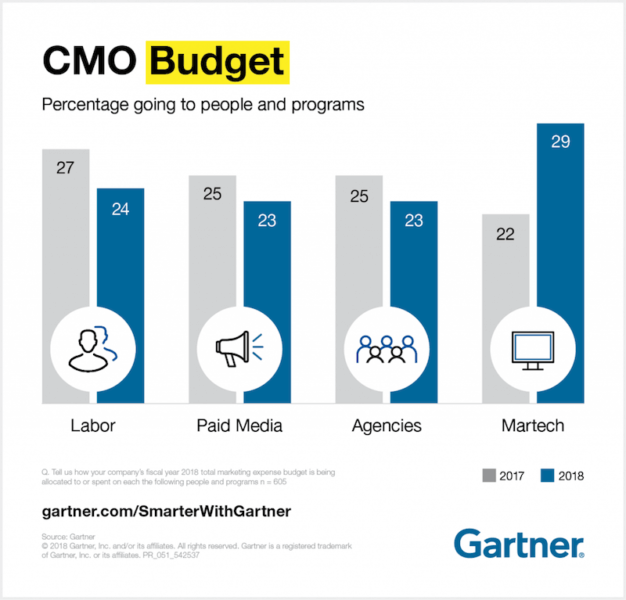Marketers react to Gartner finding: Martech spending now exceeds staff costs
A recent report by the research firm indicates that a corner may have been turned for marketing budgets.

Marketers are now spending more on marketing technology than on salaries for internal staff.
That’s a key finding in the recent Gartner CMO Spend Survey 2018-2019, which surveyed UK- and U.S.-based senior marketing executives.
Marketers spent 29 percent of their budgets (not including media spend or agency fees) on martech last year, while allocating 24 percent of their resources to paying staff. In 2017, the percentages stood at 22 and 27 percent, respectively.
‘No surprise’
The main beneficiaries of this spending were digital analytics, content management and email marketing tools, making martech what Gartner called the “single largest area of investment when it comes to marketing resources and programs.” The top three marketing capabilities cited in the survey were marketing/customer analytics, marketing technology acquisition and use, and customer experience.
“Marketing leads are focused on building their analytics and martech capabilities because they’re the muscle groups that need the most development,” HubSpot VP and MarTech Conference program chair Scott Brinker posted about the report. But, he added, the whole purpose of this development is to move toward the objectives of customer acquisition and retention.

“It’s no surprise,” Acquia CMO Lynne Capozzi told me via email. She noted that a study by her company, which serves companies using open source content management software Drupal, found that 62 percent of global marketers plan to spend more on martech over the next 12 months, in part to simplify the current complexity of connecting systems and data to deliver good customer experiences.
‘Tremendous race to understand data’
Phil Ahad, EVP of Strategy and Products at online survey provider Toluna, said that enterprises — such as those favored in the Gartner report — have “a lot more room to reduce costs” of staff salaries through marketing technology than do smaller companies, which are leaner.
“I’m not at all surprised” at the Gartner finding, David Frankel, managing partner of sales and marketing consultancy Slingstone Group, told me. He’s the former CMO of financial data firm Edgar Online and of alternative lending company Tapify.
Both from his personal experience and from observing the marketplace, he said, it’s clear there’s a “tremendous race to understand the data around customer experience.”
In 2011 and 2012, he said, marketers started talking about Big Data, but efforts were mostly focused on harnessing and structuring it.
“People didn’t fully understand what you could do with the data,” he added, noting that we’ve since begun to focus on using data to support customer experience through the targeting of individuals with messages, best offers and streamlined processes.
‘A game of catch up’
Now, there is a greater understanding among marketers that they need analytical and implementation tools to improve experience through a better understanding of customer data, he said.
“It’s a game of catch up” based around data, he added.
Frankel said that he didn’t believe this increased spending on martech will fall off over the next year. “We’re seeing a new status quo,” he said, especially since AI needs a growing infrastructure to capture, clean, manage and feed quality data, and since SaaS services involve ongoing subscriptions.
Bayer VP of Media Strategy and Platforms Josh Palau agreed that this emphasis on martech spending “is probably where the industry is going,” in large part because many marketing services are purchased in the cloud, through software as a service offerings.
In his previous stint at Johnson & Johnson, he recalled, obtaining a social listening service subscription added a substantial capacity that required very little commitment in terms of internal staffing. Palau said “maybe two people” were involved in using the subscription at the brand.
Much of his internal staff these days is focused on strategy and management, he noted, since cloud-based services are used to meet needs that once would have required significant internal personnel. Even though Bayer is working to bring all digital media in house, he said, there will still be an ongoing need for the outside cloud-based services.
“It’s a lot easier to change platforms than to change staff,” he pointed out.
This story first appeared on MarTech Today. For more on marketing technology, click here.
Marketing Land – Internet Marketing News, Strategies & Tips
(17)



